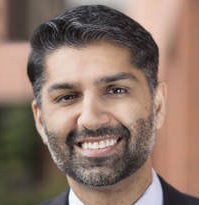Conflicts in Patent Prosecution: Avoiding the Ethical Pitfalls
Minimizing Risks of Malpractice Liability and Ethics Sanctions

Welcome! Strafford is now BARBRI! The expert courses you know from the trusted global leader in legal education.
Course Details
- smart_display Format
On-Demand
- signal_cellular_alt Difficulty Level
Intermediate
- work Practice Area
Patent
- event Date
Tuesday, August 20, 2024
- schedule Time
1:00 p.m. ET./10:00 a.m. PT
- timer Program Length
90 minutes
-
This 90-minute webinar is eligible in most states for 1.5 CLE credits.
-
Live Online
On Demand
This CLE course will guide IP counsel on the unique conflict issues that often arise in patent prosecution. The panel will outline best practices to identify and address the risks and minimize conflicts that can lead to malpractice liability and ethical violations.
Faculty

Mr. Ali provides legal representation of professionals across many regulated industries to limit, defend and deflect liability in regulatory and professional conduct investigations, enforcement actions, arbitrations, and court cases. He formerly investigated and assisted in the prosecution of attorney misconduct at the USPTO Office of Enrollment and Discipline (OED). While at the OED, he helped to promulgate the USPTO Rules of Professional Conduct. He has routinely presented and written regarding best practices for professionals to avoid regulator complaints. He is an adjunct professor of law at Lewis and Clark Law School.

Ms. Kepler designs and develops content and distribution of risk control initiatives relevant to the practice of law. She collaborates with the underwriting and claims teams to develop and execute strategies for the profitable growth of the program. Ms. Kepler lectures frequently at CNA-sponsored events and at state and local bar associations and national seminars hosted by industry-leading organizations. She also writes articles focusing on law firm risk control and professional responsibility issues. Prior to joining CNA, Ms. Kepler served as the Director of the ABA’s Center for Professional Responsibility, providing national leadership in developing and interpreting standards and scholarly resources in legal and judicial ethics, professional regulation, professionalism, client protection, professional liability and attorney well-being. Ms. Kepler is a former Associate Solicitor in the Office of General Counsel for the USPTO, where she concentrated her practice in the investigation, prosecution and appeal of patent/trademark practitioner disciplinary matters before the Agency, U.S. District Courts and Federal Circuit, provided policy advice on ethics and discipline related matters to senior management, and drafted and revised Agency regulations. Ms. Kepler has served in various volunteer capacities, including as President, on the Board of the National Organization of Bar Counsel, a nonprofit organization of legal professionals whose members enforce ethics rules that regulate the professional conduct of lawyers who practice law in the U.S. and abroad. She is Adjunct Professor at Georgetown University Law School, Loyola University Chicago School of Law, and American University Washington College of Law.
Description
Counsel and law firms involved in patent prosecution must carefully evaluate client representations to avoid conflicts that could jeopardize clients' rights, breach fiduciary duties, and violate the USPTO Rules of Professional Conduct and accompanying state legal ethics rules. Conflicts may arise when patent attorneys move between firms or develop knowledge in particular areas and seek more clients in those areas, and especially with respect to subject matter conflicts.
In addition to these traditional conflicts of interest, patent prosecutors must also identify and address risks related to the subject matter, client confidentiality, and other troublesome situations such as employers and investors with adverse interests. Furthermore, as these issues converge, practitioners should be mindful of their Duty of Disclosure and Candor obligations to the USPTO.
Listen as our authoritative panel of IP counsel examines the issues of the conflicts that arise in patent prosecutions and outlines best practices for identifying, addressing, and minimizing the potential risks and liability of such conflicts of interest.
Outline
- Rules governing conflicts
- USPTO rule
- State ethics rules
- Fiduciary duties
- Identifying conflict: when do they arise
- Adverse or potentially adverse representations to other current or former clients
- Representations substantially related to work for previous clients
- Screening
- Monitor
- Blocking new client/matter that would raise conflict
- Prospective consent
- Detecting conflicts that arise later
- What to do when screens fail
- Cautionary tales
- Best practices
- Pre-conflict planning
- Risk management
- Resolving conflicts when they arise
- Case updates
Benefits
The panel will review these and other critical issues:
- What policies and practices should counsel have in place to identify potential conflicts in patent prosecutions?
- What steps can patent prosecutors take to minimize the risk of subject matter conflicts?
- How should patent counsel respond after identifying conflicts?
Unlimited access to premium CLE courses:
- Annual access
- Available live and on-demand
- Best for attorneys and legal professionals
Unlimited access to premium CPE courses.:
- Annual access
- Available live and on-demand
- Best for CPAs and tax professionals
Unlimited access to premium CLE, CPE, Professional Skills and Practice-Ready courses.:
- Annual access
- Available live and on-demand
- Best for legal, accounting, and tax professionals
Unlimited access to Professional Skills and Practice-Ready courses:
- Annual access
- Available on-demand
- Best for new attorneys
